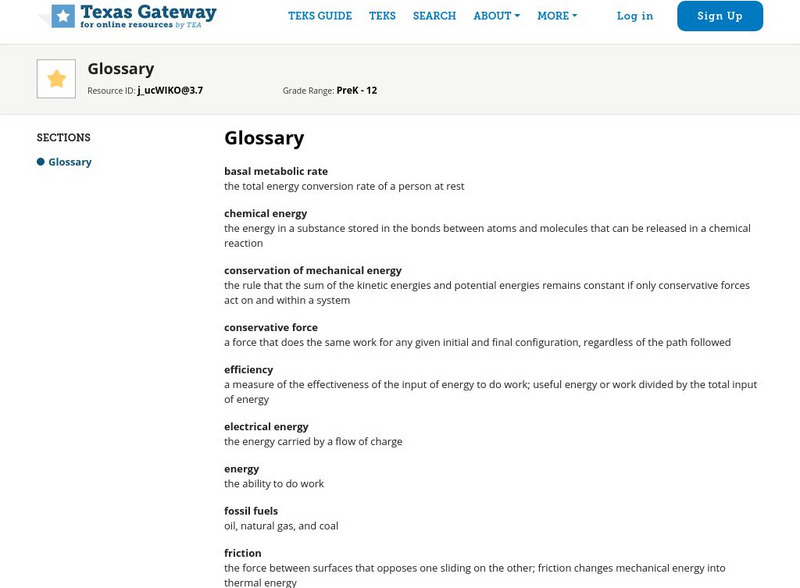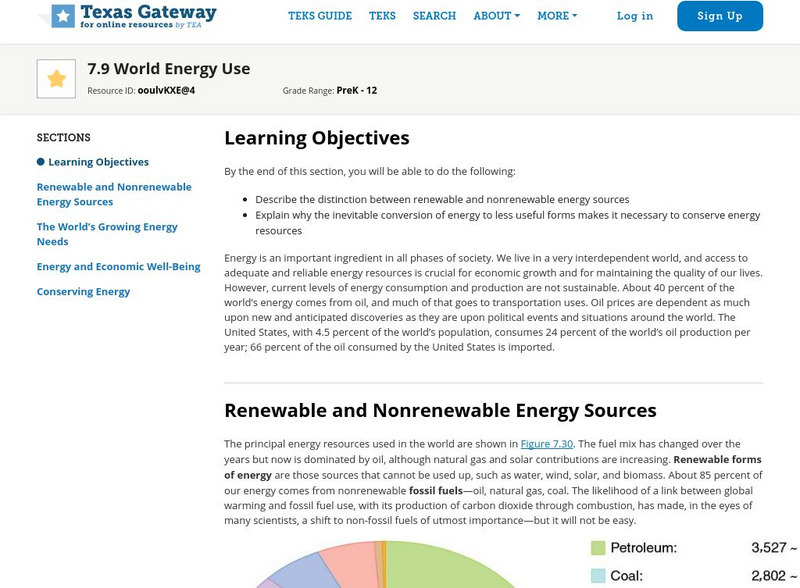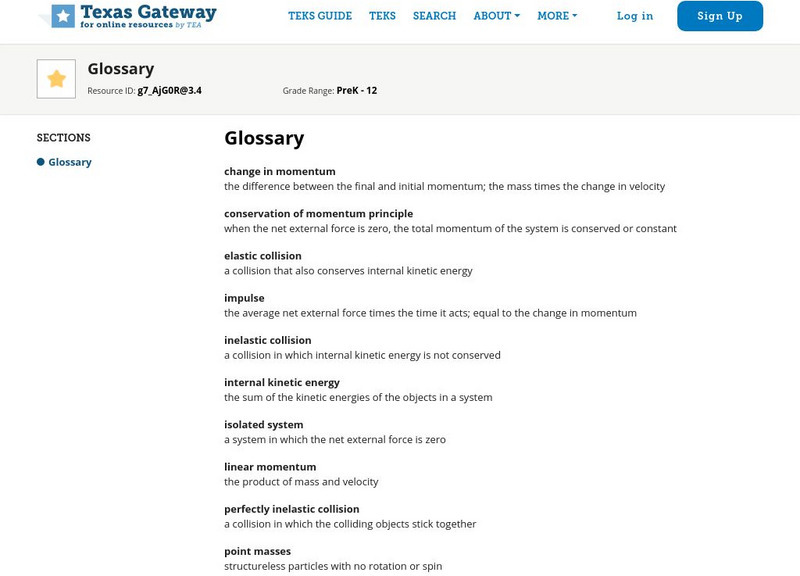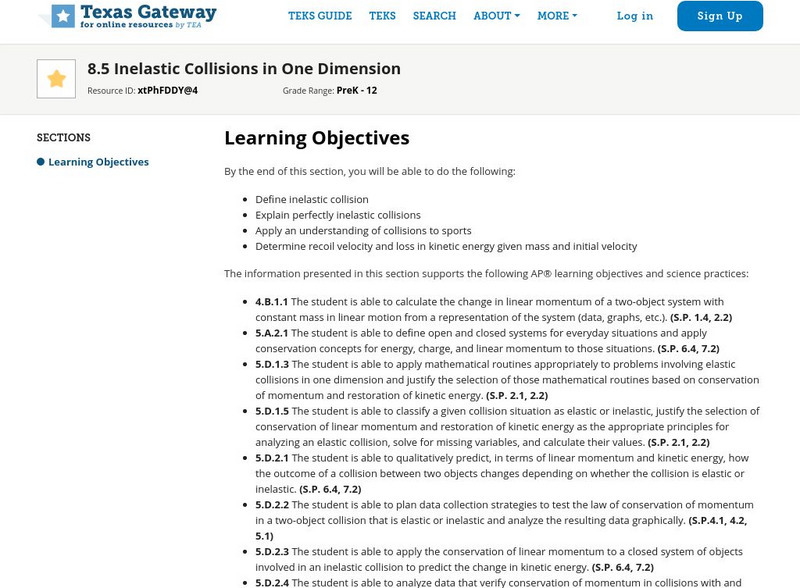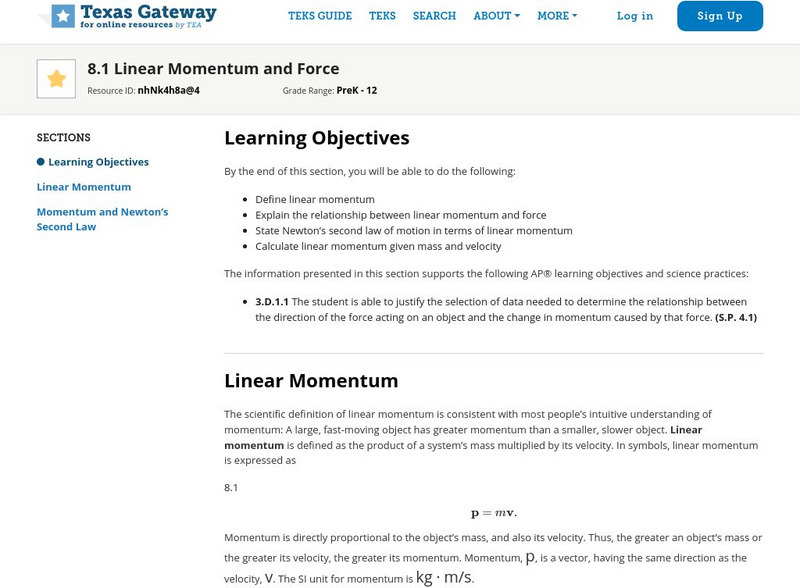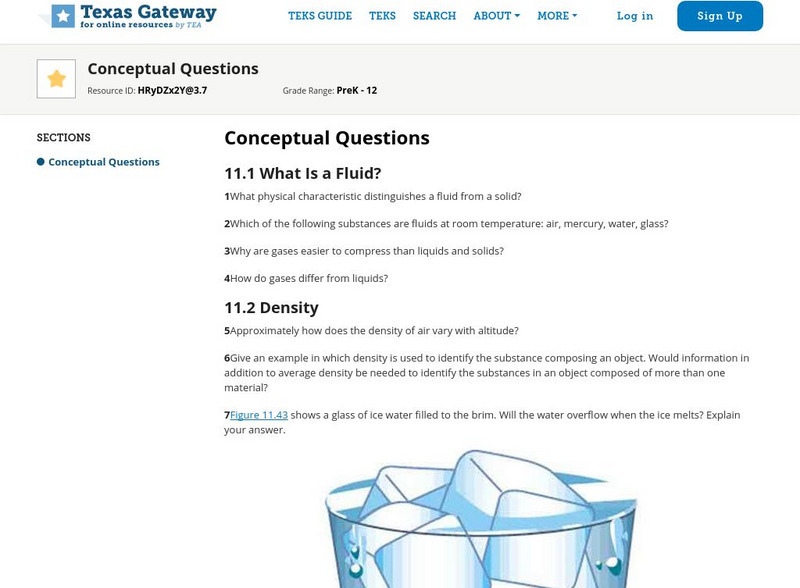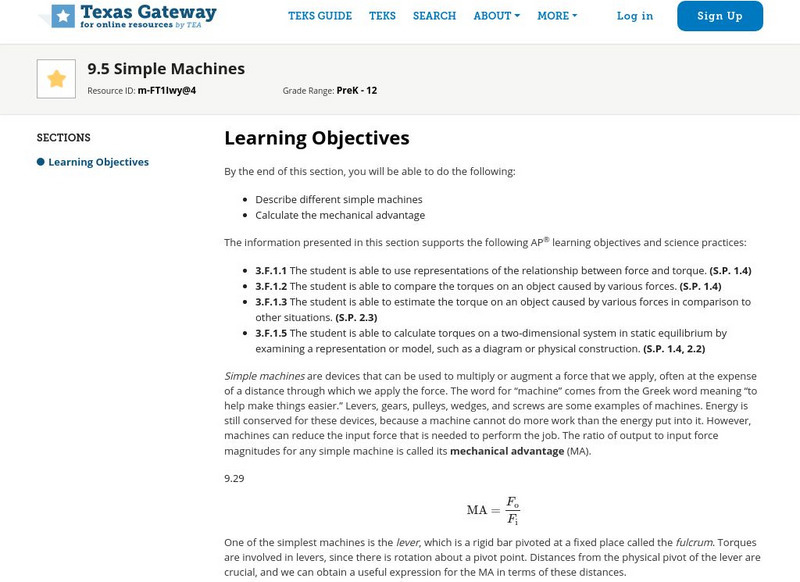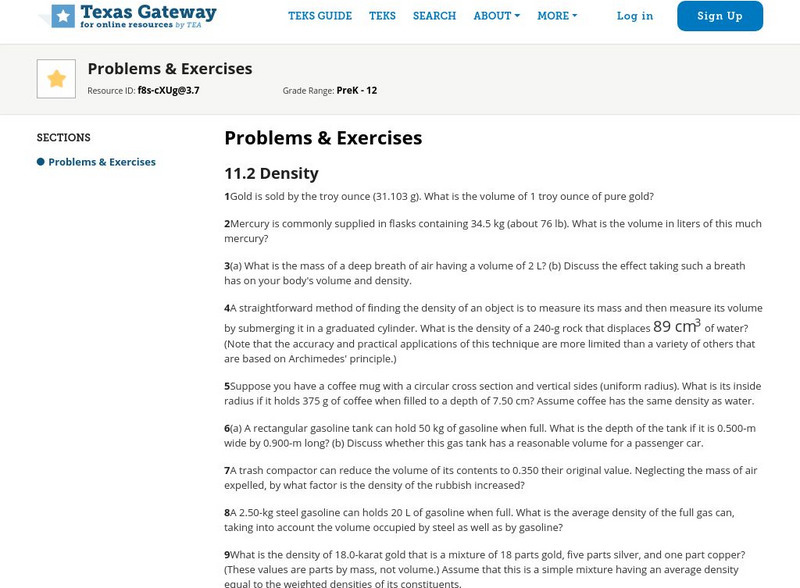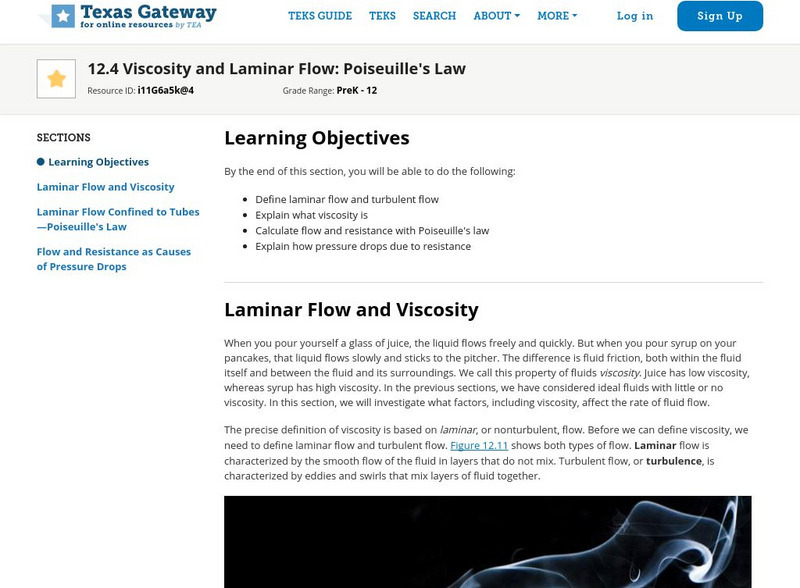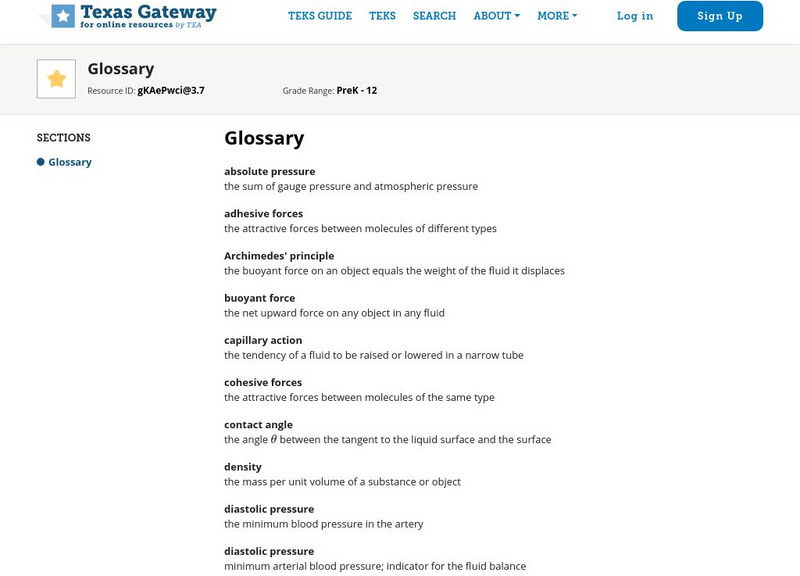Texas Education Agency
Texas Gateway: Work, Energy, and Energy Resources: Conceptual Questions
This page provides a list of 26 questions covering the major concepts in Chapter 7: Work, Energy, and Energy Resources from the AP Physics online text.
Texas Education Agency
Texas Gateway: Work, Energy, and Energy Resources: Summary
This is a summary of the information in Chapter 7: Work, Energy, and Energy Resources for the AP Physics I course online.
Texas Education Agency
Texas Gateway: Work, Energy, and Energy Resources: Glossary
This is a glossary of words and definitions of terms having to do with work, energy, and energy resources.
Texas Education Agency
Texas Gateway: Ap Physics: World Energy Use
By the end of this section, you will be able to describe the distinction between renewable and nonrenewable energy sources and to explain why the inevitable conversion of energy to less useful forms makes it necessary to conserve energy...
Texas Education Agency
Texas Gateway: Linear Momentum and Collisions: Glossary
This is a glossary of the terms and definitions used in Chapter 8: Linear Momentum and Collisions from the AP Physics online text.
Texas Education Agency
Texas Gateway: Linear Momentum and Force: Introduction to Rocket Propulsion
By the end of this section, you will be able to state Newton's third law of motion, explain the principle involved in propulsion of rockets and jet engines, derive an expression for the acceleration of the rocket , discuss the factors...
Texas Education Agency
Texas Gateway: Collisions of Point Masses in Two Dimensions
By the end of this section, you will be able to discuss two-dimensional collisions as an extension of one-dimensional analysis, define point masses, derive an expression for conservation of momentum along the x-axis and y-axis, describe...
Texas Education Agency
Texas Gateway:linear Momentum & Collision: Inelastic Collisions in One Dimension
By the end of this section, you will be able to define inelastic collision, explain perfectly inelastic collisions, apply an understanding of collisions to sports, and determine recoil velocity and loss in kinetic energy given mass and...
Texas Education Agency
Texas Gateway: Linear Momentum & Collisions: Elastic Collisions in One Dimension
By the end of this section, you will be able to describe an elastic collision of two objects in one dimension, define internal kinetic energy, derive an expression for conservation of internal kinetic energy in a one-dimensional...
Texas Education Agency
Texas Gateway: Linear Momentum and Collisions: Conservation of Momentum
By the end of this section, you will be able to describe the law of conservation of linear momentum, derive an expression for the conservation of momentum, explain conservation of momentum with examples, and explain the law of...
Texas Education Agency
Texas Gateway: Linear Momentum and Collisions: Impulse
By the end of this section, you will be able to define impulse; describe effects of impulses in everyday life; determine the average effective force using graphical representation; and calculate average force and impulse given mass,...
Texas Education Agency
Texas Gateway: Linear Momentum and Force
By the end of this section, you will be able to define linear momentum, explain the relationship between linear momentum and force, state Newton's second law of motion in terms of linear momentum, and calculate linear momentum given mass...
Texas Education Agency
Texas Gateway: Ap Physics: Fluid Statics: Conceptual Questions
This is a list of 39 questions covering the concepts presented in Chapter 11: Fluid Statics from the AP Physics online text.
Texas Education Agency
Texas Gateway: Ap Physics: Statics and Torque: Problems and Exercises
This is a list of 40 problems/exercises to solve covering the content of Chapter 9: Statics and Torque from the AP Physics online text.
Texas Education Agency
Texas Gateway: Forces and Torques in Muscles and Joints
By the end of this section, you will be able to explain the forces exerted by muscles; state how a bad posture causes back strain; discuss the benefits of skeletal muscles attached close to joints; and discuss various complexities in the...
Texas Education Agency
Texas Gateway: Statics and Torque: Simple Machines
By the end of this section, you will be able to describe different simple machines and to calculate the mechanical advantage.
Texas Education Agency
Texas Gateway: Ap Physics: Fluid Statics: Problems and Exercises
This is a list of 83 problems/exercises to solve based on the content in Chapter ll: Fluid Statics from the AP Physics online text.
Texas Education Agency
Texas Gateway: Viscosity and Laminar Flow: Poiseuille's Law
By the end of this section, you will be able to define laminar flow and turbulent flow, explain what viscosity is, calculate flow and resistance with Poiseuille's law, and explain how pressure drops due to resistance.
Texas Education Agency
Texas Gateway: Angular Momentum and Its Conservation
By the end of this section, you will be able to understand the analogy between angular momentum and linear momentum, observe the relationship between torque and angular momentum, and apply the law of conservation of angular momentum.
Texas Education Agency
Texas Gateway: Rotational Kinetic Energy: Work and Energy Revisited
By the end of this section, you will be able to derive the equation for rotational work, calculate rotational kinetic energy, and demonstrate the law of conservation of energy.
Texas Education Agency
Texas Gateway: Dynamics of Rotational Motion: Rotational Inertia
By the end of this section, you will be able to understand the relationship between force, mass, and acceleration; study the turning effect of force; study the analogy between force and torque, mass and moment of inertia, and linear...
Texas Education Agency
Texas Gateway: Ap Physics: Kinematics of Rotational Motion
By the end of this section, you will be able to observe the kinematics of rotational motion, derive rotational kinematic equations, and evaluate problem solving strategies for rotational kinematics.
Texas Education Agency
Texas Gateway: Ap Physics: Angular Acceleration
By the end of this section, you will be able to describe uniform circular motion, explain nonuniform circular motion, calculate angular acceleration of an object, and observe the link between linear and angular acceleration.
Texas Education Agency
Texas Gateway: Fluid Statics: Glossary
This is a glossary of terms and definitions used in Chapter 11: Fluid Statics from the AP Physics online text.




